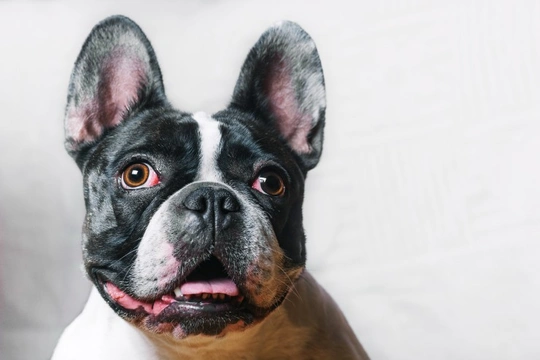
Noisy breathing and snoring while awake in dogs
Some dogs are simply more noisy than others-more vocal, expressive and keen to use their voices and other sounds to let you know how they are feeling and if they need something, and this is what we call voluntary sounds, which means noises that your dog makes deliberately and has some control over.
However, when it comes to breathing and snoring, these are what are known as involuntary sounds, which means that your dog has little to no control over how loud they are and is likely not even really aware of the noise. Some dogs snore a lot and are snuffly and breathe audibly when awake, even at rest-as opposed to simply panting and making more noise after exertion or exercise, while others breathe virtually silently unless they are panting.
For some dogs, this noisy breathing or apparent snoring whilst the dog is awake is normal, and caused due to their conformation, but it can also indicate a potential problem in the making, particularly if this is not common for your dog’s specific breed or type.
In this article, we will examine noisy breathing and the apparent phenomenon of snoring while awake in dogs, and some of the potential reasons behind it. Read on to learn more.
Breed and conformation issues
The most common cause of audible breathing that may sound laboured, whistling, snuffly or like snoring while the dog is awake is due to their conformation, which we usually associate with dogs with brachycephalic faces. A brachycephalic face is one with a short, flat muzzle, which leads to shorter than normal nasal passages and sometimes, prominent eyes-such as is the breed standard for flat-faced dogs like the French bulldog and Cavalier King Charles spaniel.
While the brachycephalic face is a breed standard trait and accepted within the breed norms for dogs like these, this unusual conformation is actually a genetic anomaly, which we have selectively bred into the breeds in question. The degree of exaggeration of the flatness is what dictates how noisy or otherwise the dog’s normal breath sounds will be, and the less acute the exaggeration, the quieter it will be.
In dogs with highly exaggerated features, the chances of them breathing noisily and snoring while awake rise exponentially, to the point that this can actually affect the dog’s health. In this situation, they may even require corrective surgery to allow them to breathe comfortably and normally.
Obesity
Dogs that are overweight are much more likely to breathe noisily and snore both when awake and asleep than dogs of a healthy weight, regardless of their breed. This is because the extra fat that they are carrying around can occlude the airways, leading to them becoming restricted and making it harder for them to exchange air through the lungs normally. Bringing the dog back down to a healthy weight will make a huge difference to their breath sounds, and improve their general health in a whole range of other ways too.
Keeping your dog at a healthy weight is important regardless of breed, but if your dog is brachycephalic, this is especially important, as they will already have elevated chances of potential breathing issues due to their conformation.
Allergies
Allergies to food, pollen or virtually anything else can have a systemic effect on the dog, causing anomalies as varied as digestive upsets to hayfever-like symptoms, regardless of the allergen in question.
Because the effect that allergies can have on dogs can be so varied, it can be a challenge to spot an allergy in the first place, much less narrow it down to a particular cause. However, if your dog has a normal muzzle structure and is at a healthy weight and yet still appears to snore while awake or generally be noisy when breathing, allergies is one of the first things that your vet is likely to look into.
Infections and viruses
If you have a cough, cold or flu, the chances are that your own breathing will be rather laboured and noisy, and you may even be snoring at night even if you are not normally a noisy sleeper! The same is true for dogs, so if your dog’s breath sounds are normally quiet but they appear to have a case of the snuffles, this can lead to noisy sounding breathing and snoring while awake.
Minor infections of the respiratory tract usually clear themselves up within a day or two in healthy dogs, but if the problem persists or your dog doesn’t seem to be shaking it off, take them to the vet.
Inhaled blockages
When a dog sniffs around, they usually like to get their heads right into whatever it is that they are sniffing, which means that they can potentially inhale small foreign bodies like grass seeds. The small hairs in the nose (called cilia) and nasal mucous all work together to avoid things that the dog inhales entering the nasal cavities or the rest of the respiratory system, but this can still happen on occasion.
If your dog is breathing noisily and displays other symptoms such as sneezing a lot or pawing at their face as if something is bothering them, they may have something lodged in their nasal cavity, which will require investigation by your vet.



